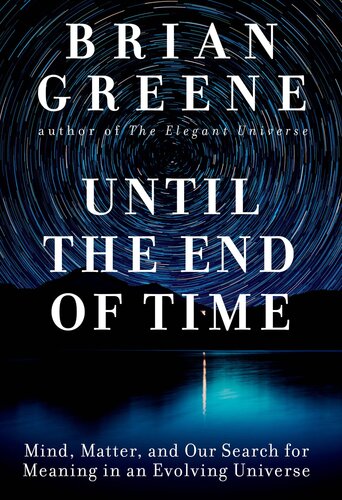
Until the End of Time
Mind, Matter, and Our Search for Meaning in an Evolving Universe
کتاب های مرتبط
- اطلاعات
- نقد و بررسی
- دیدگاه کاربران
نقد و بررسی

January 1, 2020
The author of several bestselling explorations of cutting-edge physics turns his attention to the cosmos, and readers will encounter his usual astute observations and analysis. Greene (Physics and Mathematics/Columbia Univ.; The Hidden Reality: Parallel Universes and the Deep Laws of the Cosmos, 2016) quotes from philosopher Bertrand Russell who, in a 1948 radio debate with a cleric, based his agnosticism on a scientific law: "the universe has crawled by slow stages to a somewhat pitiful result on this earth and is going to crawl by still more pitiful stages to a condition of universal death...if this is to be taken as evidence of purpose, I can only say that the purpose is one that does not appeal to me." Russell is referring to the second law of thermodynamics, which states that "everything in the universe has an overwhelming tendency to run down, to degrade, to wither." Greene explains that this is entropy, a term that is often popularly defined as a gradual slide into disorder. In the Big Bang, a supremely ordered low entropy kernel of energy expanded into the familiar universe, but entropy's steady increase will lead to a uniformly disordered cold, lifeless emptiness--although not for a long time. The law allows plenty of local, highly organized, low entropy areas--galaxies, stars, civilization--whose existence is more than balanced by wasted energy they produce. Having announced his theme, Greene regularly returns to it in 11 chapters that begin at the Big Bang and proceed with deeply learned, sharp, never dumbed-down accounts of what scientists know about star formation, planet formation, life's origins, evolution, consciousness, language, culture, and religion. The author concludes his engaging survey with what the future might hold for humans (very long life) and the universe (even longer); beyond a certain entropy, however, there will be no room for us. An insightful history of everything that simplifies its complex subject as much as possible but no further.
COPYRIGHT(2020) Kirkus Reviews, ALL RIGHTS RESERVED.

Starred review from February 3, 2020
Greene (The Hidden Reality), director of Columbia University’s Center for Theoretical Physics, translates sophisticated science topics into an accessible and illuminating survey. His achievement is particularly remarkable given the cerebral subject—the “fundamental transience of everything” in the universe, and of the universe itself. Greene digests the latest scientific thinking on how the universe began; on molecular Darwinism, the “chemical combat” believed to have triggered the transformation of inanimate collections of atoms into life; and on the nature of consciousness. Greene effectively illustrates his points with understandable examples, as when he uses pennies, all arranged heads-up, to explain entropy; shaking the coins will flip some of the coins to tails, thus increasing disorder, but is highly unlikely to return them all to the ordered state of all-heads. He concedes that some profound questions—“Why is there something rather than nothing?”—are currently unanswerable, though he is convinced that “there is no grand design,” and that people must construct their own meaning. Curious readers interested in some of the most fundamental questions of existence, and willing to invest some time and thought, will be richly rewarded by his fascinating exploration.

February 1, 2020
Why does the universe exist? How will it end? What does it all mean? Greene (The Fabric of the Cosmos, 2004), a leading cosmic thinker and popular science writer, attempts to tackle these questions with an eye to explaining our deep need to believe we can be part of something eternal that is focused on the central role of entropy and Darwinian evolution in the unfolding of the universe. He begins with the Big Bang and concludes with explorations of how the universe might end. He explores the development of planets and complex life, the birth of mind, language, and creativity, awareness of mortality, the rise of storytelling, religion, and our attempts to leave some kind of permanent testament to our existence. He serves broad, high level summaries of ideas from physics, biology, neuroscience, philosophy, the arts, storytelling, and anthropology. He provides enough background to follow the meat of the discussion but he doesn't water it down for nonspecialists. There's tremendous joy in witnessing a brilliant and curious mind wrestle with such profound issues. He takes readers on a remarkable journey.(Reprinted with permission of Booklist, copyright 2020, American Library Association.)

September 1, 2019
Director of Columbia University's Center for Theoretical Physics and cofounder of the World Science Festival, Greene leads us from the big bang until the end of time, showing how galaxies have formed, biochemical mechanisms have pushed forth life, and neurons have zapped consciousness (and finally culture) into being even as the universe tends toward entropy. Greene's first book since 2011, so fans will be swarming all over it; his works have sold over two million across formats.
Copyright 2019 Library Journal, LLC Used with permission.

























دیدگاه کاربران